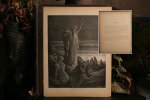- Sep 10, 2021
- 5,401
- 4,703
Is 1 Corinthians 13:8-12 A Cessationist Passage?

In 1st Corinthians 13, Paul stated the following: "For we know in part and we prophesy in part, but when that which is perfect comes, that which is in part will be set aside... for now we see through a glass darkly, but then we will see face to face. Now I know in part, but then I shall know even as I have been known" (1 Corinthians 13:8-10, 12).
The Greek used here was βλέπομεν γὰρ ἄρτι δι' ἐσόπτρου ἐν αἰνίγματι, τότε δὲ πρόσωπον πρὸς πρόσωπον, which reads literally as "now we see through a glass in an enigma, but then face to face." Paul was here making use of Numbers 12, where it states, "Then the Lord came down in a pillar of cloud. He stood at the entrance to the tent, and summoned Aaron and Miriam. When the two of them stepped forward, He said, 'Listen to My words. When there is a prophet among you, I the Lord reveal Myself to him in visions. I speak to him in dreams. But this is not true of My servant Moses. He is faithful in all My house. With him I speak face to face clearly, and not in enigmas. He sees the [very] form of the Lord. Why, then, were you not afraid to speak against My servant Moses?” (Numbers 12:5-8, LXX).
Paul used the same two phrases from this passage in Numbers from the LXX (Greek translation of the Old Testament), which shows this is the passage he was alluding to, and he used these exact same two expressions to make the same comparisons. God spoke "face to face" (πρόσωπον πρὸς πρόσωπον) with Moses, but to His prophets He spoke "in enigmas" (ἐν αἰνίγματι). An enigma is what a prophetic dream or vision is like. It is a riddle, which is why some translations read, "For now we see through a glass in obscurity (or in riddles)." Throughout ancient Greek, the word αίνιγμα is almost invariably translated into English as "dark sayings, riddles," hence the translations, "seeing through a glass darkly." In ancient times, glass was not nearly as refined as it is now. You could see through it a little, but the image was often very blurry and "dark," thus it took perception to discern what you were actually looking at through it. This parallels with what it is like to interpret prophetic dreams and visions, and also to what it is like prophesying directly over the lives of others one does not know. The one prophesying doesn't have a clue about the person he is prophesying over, so he is simply uttering what the Spirit of God is leading him to say even though at the moment he is still completely in the dark about it.

Chapters 12 through 14 deal with the issue of operating in tongues and prophecy, and point out how prophecy is superior, being the greater gift, because it brings greater edification to the saints. But until we get to Heaven, Biblical prophecy would always be needed because we do not truly see one another face to face yet and know one another's inner most secrets as God does. In conclusion then and in context, the passage has nothing to do with the gifts ceasing or the canon being closed. Quite the opposite, it teaches the need for the gifts until the Lord comes.
Below is a Christian apologist discussing this passage, and the pros and cons of the two most prominent Cessationist arguments. I have not finished it yet, but I have found the parts I have been able to watch quite informative. Comments on either my write up or the video are welcome, but please keep the discussion centered on 1 Corinthians 13 and the surrounding Chapters and verses.
Blessings in Christ,
Hidden In Him

In 1st Corinthians 13, Paul stated the following: "For we know in part and we prophesy in part, but when that which is perfect comes, that which is in part will be set aside... for now we see through a glass darkly, but then we will see face to face. Now I know in part, but then I shall know even as I have been known" (1 Corinthians 13:8-10, 12).
The Greek used here was βλέπομεν γὰρ ἄρτι δι' ἐσόπτρου ἐν αἰνίγματι, τότε δὲ πρόσωπον πρὸς πρόσωπον, which reads literally as "now we see through a glass in an enigma, but then face to face." Paul was here making use of Numbers 12, where it states, "Then the Lord came down in a pillar of cloud. He stood at the entrance to the tent, and summoned Aaron and Miriam. When the two of them stepped forward, He said, 'Listen to My words. When there is a prophet among you, I the Lord reveal Myself to him in visions. I speak to him in dreams. But this is not true of My servant Moses. He is faithful in all My house. With him I speak face to face clearly, and not in enigmas. He sees the [very] form of the Lord. Why, then, were you not afraid to speak against My servant Moses?” (Numbers 12:5-8, LXX).
Paul used the same two phrases from this passage in Numbers from the LXX (Greek translation of the Old Testament), which shows this is the passage he was alluding to, and he used these exact same two expressions to make the same comparisons. God spoke "face to face" (πρόσωπον πρὸς πρόσωπον) with Moses, but to His prophets He spoke "in enigmas" (ἐν αἰνίγματι). An enigma is what a prophetic dream or vision is like. It is a riddle, which is why some translations read, "For now we see through a glass in obscurity (or in riddles)." Throughout ancient Greek, the word αίνιγμα is almost invariably translated into English as "dark sayings, riddles," hence the translations, "seeing through a glass darkly." In ancient times, glass was not nearly as refined as it is now. You could see through it a little, but the image was often very blurry and "dark," thus it took perception to discern what you were actually looking at through it. This parallels with what it is like to interpret prophetic dreams and visions, and also to what it is like prophesying directly over the lives of others one does not know. The one prophesying doesn't have a clue about the person he is prophesying over, so he is simply uttering what the Spirit of God is leading him to say even though at the moment he is still completely in the dark about it.

Chapters 12 through 14 deal with the issue of operating in tongues and prophecy, and point out how prophecy is superior, being the greater gift, because it brings greater edification to the saints. But until we get to Heaven, Biblical prophecy would always be needed because we do not truly see one another face to face yet and know one another's inner most secrets as God does. In conclusion then and in context, the passage has nothing to do with the gifts ceasing or the canon being closed. Quite the opposite, it teaches the need for the gifts until the Lord comes.
Below is a Christian apologist discussing this passage, and the pros and cons of the two most prominent Cessationist arguments. I have not finished it yet, but I have found the parts I have been able to watch quite informative. Comments on either my write up or the video are welcome, but please keep the discussion centered on 1 Corinthians 13 and the surrounding Chapters and verses.
Blessings in Christ,
Hidden In Him





